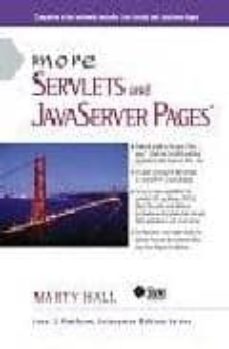MORE SERVLETS AND JAVASERVER PAGES de MARTY HALL
Ficha técnica
- MORE SERVLETS AND JAVASERVER PAGES
- MARTY HALL
- Número de páginas: 450
- Idioma: INGLÉS
- Formatos: Pdf, ePub, MOBI, FB2
- ISBN: 9780130676146
- Editorial: PRENTICE-HALL INTERNATIONAL EDITION
- Año de edición: 2002
Libera descargas de libros MORE SERVLETS AND JAVASERVER PAGES
Overview
Companion to the worldwide bestseller Core Servlets and JavaServer Pages Practical guide to the use of the Java Platform for Web-enabled applications and dynamic Web sites Focus on new capabilities: the servlet 2.3 and JSP 1.2 specifications, the standard JSP tag library (JSPTL), filters, life-cycle event listeners, security, Web applications, and much more Configuration and usage details for Apache Tomcat, Macromedia JRun, and New Atlanta ServletExec
The Java 2 Platform has become the technology of choice for developing professional e-commerce applications, dynamic Web pages, and Web-enabled applications and services. Servlet and JSP technology is the foundation of this platform: it provides the link between Web clients and server-side applications. But, the field has been evolving rapidly, and few developers have been able to keep up. In this companion to Core Servlets and JavaServer Pages, Marty Hall shows you how to apply recent advances in servlet and JSP technology. The book provides everything you need to know to leverage the latest servlet 2.3 and JSP 1.2 standards: real-world insight, advanced techniques, industrial-strength code, and hands on coverage of three top servers: Apache Tomcat, Macromedia JRun, and New Atlanta ServletExec. Part I gives a thorough introduction to programming with servlet and JSP technology. It shows you how to configure your server, read form data and HTTP headers, handle cookies, track sessions, apply JSP scripting elements, use JavaBeans components, develop JSP tag libraries, and apply the MVC architecture. Part II provides exhaustiveWeb application development and deployment. It explains how to register Web applications, how to organize them, how to deploy them in WAR files, how to deal with relative URLs, and how to share data among Web applications. It also gives details on every element in version 2.3 of the deployment descriptor (web.xml). Part III describes Web application security in detail. It explains two general strategies for securing your applications: declarative security and programmatic security. Within each of these strategies, it shows you how to use form-based or BASIC authentication and how to protect your network traffic with SSL. Part IV covers two features introduced with servlets 2.3: filters and life-cycle events. It explains how to use filters to debug, modify, and optimize the output of previously existing servlets and JSP pages. It also shows you how to use event listeners to resp


0コメント